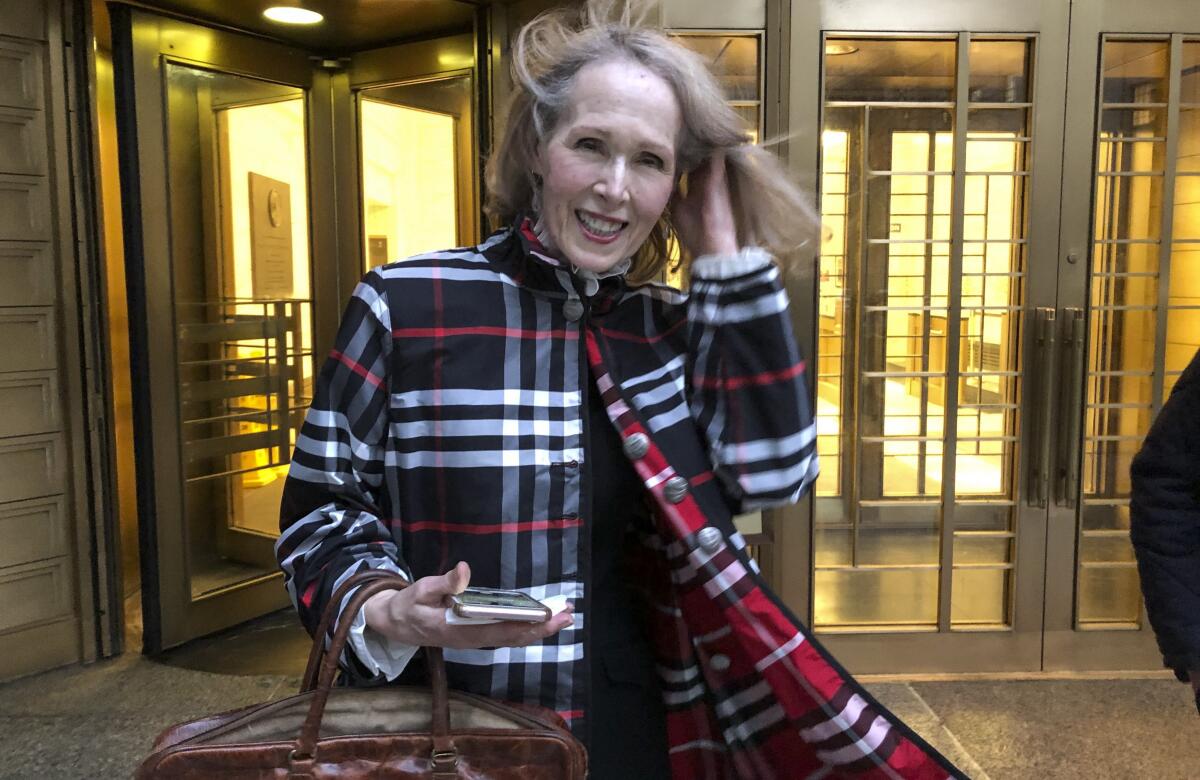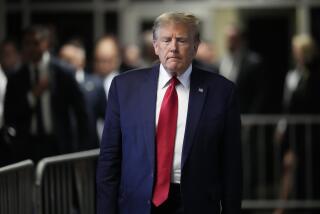Donald Trump’s DNA, not deposition, sought in defamation suit

- Share via
NEW YORK — A lawyer for a woman who accused Donald Trump of raping her in the mid-1990s and then filed a defamation lawsuit against him said Tuesday that she will not seek to depose Trump before trial because it would cause unnecessary delay. She added, however, that a DNA sample was still being sought.
Attorney Roberta Kaplan first made the revelation in Manhattan federal court during a pretrial hearing before explaining the decision to reporters outside the court as her client, E. Jean Carroll, stood by her side.
A deposition, Kaplan said, would “inevitably result in an inordinate amount of delay.”
“We want the case to go forward,” she said.
Attorney Alina Habba, who represented Trump at the hearing, said outside court that she had not previously heard that Carroll’s lawyers did not want a deposition, a proceeding in which lawyers in civil cases question likely witnesses under oath before trial.
“It’s surprising,” Habba said.
As for a DNA sample, Habba said: “None has been demanded.”
Kaplan, though, said the DNA sample had been requested after the case was first filed in state court, and the demand still exists after it was moved to federal court.
She said she would be “more than perfectly happy” to wait to interview Trump at trial, which she estimated could occur in as little as six months, after some near-term legal obstacles are cleared.
The Associated Press generally does not identify people alleging sexual assault, but Carroll has consented to being named in the media.
She told reporters outside court that she was looking forward to the trial on behalf of all women “who have been grabbed and groped, assaulted and raped by men in power and are silenced.”
“And we are looking to bring justice, at least in this one case, against a powerful man,” she said.
Carroll said she would “never settle, never.”
“This is about principle. It’s about a powerful man assaulting and raping a woman and then getting away with it. That’s not right,” she said.
Carroll in a June 2019 book said Trump raped her in the mid-1990s in an upscale Manhattan department store.
The book excerpt prompted Trump to deny the allegations and question Carroll’s credibility and motivations in a statement from his White House press office, comments in an Oval Office interview and statements to the media as he boarded a helicopter for Camp David.
The 2nd U.S. Circuit Court of Appeals is expected to rule eventually on Trump’s request that the United States take his place as the defendant in the lawsuit. The U.S. Justice Department has asserted that Trump cannot be held personally liable for “crude and disrespectful” remarks he made about Carroll because his remarks were made as he was carrying out his duties as president.
Judge Lewis A. Kaplan, who presided over Tuesday’s hearing, ruled in October that Trump cannot use a law protecting federal employees from being sued individually for things they do within the scope of their employment.
He also has rejected a request by the former president’s attorneys that the progression of the lawsuit, including depositions, be delayed until the 2nd Circuit rules on whether Trump can be replaced as the defendant.
On Tuesday, the judge seemed to have little patience for arguments by Trump’s lawyers saying that the former president should be able to countersue Carroll under a law sometimes used to challenge defamation lawsuits that unfairly make claims.
“I question whether you have the right to do what you want to do,” he said, noting that the lawyers were seeking to countersue more than a year after the case was filed.
More to Read
Sign up for Essential California
The most important California stories and recommendations in your inbox every morning.
You may occasionally receive promotional content from the Los Angeles Times.










